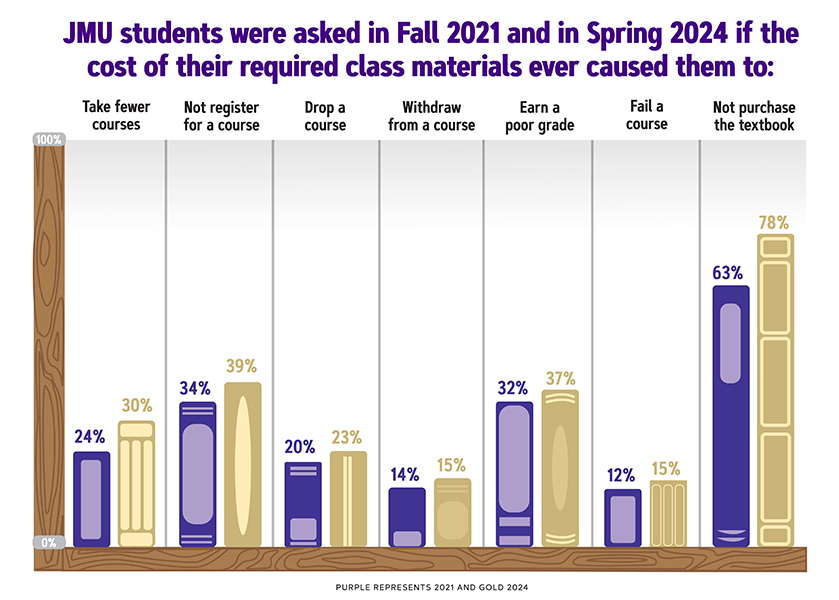Open Educational Resources address college costs
News
SUMMARY: The cost of classroom books and supplies has proven to be a serious problem for some students. Open Educational Resources prioritize accessibility, affordability and quality of course materials.
Hear more episodes and subscribe to the podcast at the Being the Change podcast page.
A campus-wide effort led by JMU Libraries encourages the use of free or affordable texts in JMU courses. By assigning Open Educational Resources, instructors can build their courses around texts licensed for free online use. They can even publish materials that students and instructors around the world can access for free.
“It lessens the costs of pursuing a college degree,” said Liz Thompson, open education librarian and associate professor with JMU Libraries.
|
“It’s not very well known that textbooks don’t have to cost hundreds of dollars. There are high-quality, free and affordable learning materials out there.” — Liz Thompson, open education librarian |
“It’s not very well known that textbooks don’t have to cost hundreds of dollars,” she said. “There are high-quality, free and affordable learning materials out there.” The key is for instructors, administrators and other advocates to find the right sources to access these materials.
The cost of textbooks has proven to be a serious problem for some students. As of the 2023-24 academic year, JMU was recommending students budget $1,254 per year for textbooks and other supplies, a cost that increases every year.
Depending on their classes, students can spend a significant amount on books, as indicated in a 2021 JMU Virginia Course Materials survey that was repeated in 2024.
The 2021 survey showed that 34% of Dukes have chosen not to register for a course because of the cost of materials, while 24% have taken fewer courses. By 2024, those numbers rose to 39% choosing not to register for a course and 30% taking fewer courses.
Additionally, in 2021, 63% reported not purchasing a required text because of the cost, while in 2024 that number jumped to 78%. From 2021 to 2024, the percentage of respondents who admitted they earned a poor grade or failed a course because of the cost of materials rose from 44% to 52%.
The surveys showed that nearly all students found ways to keep their costs down by renting, borrowing, sharing and downloading course materials, or finding used copies, but for some students the cost of textbooks is still a barrier to education. Promoting the use of OER is one way of addressing this issue.

OER includes textbooks as well as study guides, workbooks, audiovisual materials and additional reading. Using OER helps students who are struggling financially, but these online resources are more accessible in other ways, too. As Thompson points out, “if materials are available in a variety of formats, then students can listen on a screen reader or enlarge the print. There’s all sorts of opportunities to just make learning more accessible for everybody.” Since Fall 2019, JMU instructors who have adopted OER have saved students more than $2.3 million — and OER proponents want to increase that number. “There’s definitely a lot of avenues for people to be engaged in this work,” Thompson said. “We try to track it as we go, and we’re definitely seeing a lot of growth.”
|
“By encouraging the creation and dissemination of open resources, we foster a spirit of collective growth and continuous improvement, ensuring that education remains a dynamic and evolving field.” — Malika Carter-Hoyt, vice president of diversity, equity and inclusion at JMU |
But a lot of work is still needed to overcome challenges like incentivizing instructors, who might be daunted by the barriers to including OER in their courses. Finding an OER text that can adequately replace an existing required text that they’ve used for several years isn’t always easy; however, putting in the work of redesigning a successful course also takes a lot of time and money.
That’s where Thompson and other OER advocates come in. Restructuring a course requires a significant investment of time, Thompson said. “It’s not unsubstantial. But we’re here to help with that.”
Grant money and summer stipends are available for instructors interested in offering OER materials, with support ranging from $2,000 to $50,000, with the largest grants available through Virginia state funds that encourage the writing of new cross-institutional textbooks. Gifts from donors to JMU Libraries can also go to OER efforts around campus.
In the 2023-24 academic year, JMU launched a summer stipend program that supports faculty who want to redesign their courses over the summer to incorporate open course materials. Redesigns can include creating new slide decks and syllabi, designing test banks and organizing supplemental course materials.
In the case of OER, “open” refers to anything that can be shared freely online without copyright restrictions. Textbooks are often copyrighted to prevent sharing or instructor modification, but OER can be freely shared and revised.
|
“OER is gaining visibility as a key part of our shared, campus-wide commitment to making a Madison education affordable and accessible to all.” — Bethany Nowviskie, dean of JMU Libraries |
“The authors of OER have agreed to give up some of the copyright restrictions, so it makes it less complicated for other educators to adopt the same resources,” Thompson explained. “They’re able to share the materials that they’ve created with other educators anywhere, and those people can use the works for free, too. It’s kind of paying it forward to the educational community.”
One such instructor is Diana Galarreta-Aima, an associate professor in the Spanish for the Professions program, who was awarded an Open Course Grant of $30,000 from VIVA, Virginia’s academic library consortium, to create an online training program for Medical Spanish. The open online resource will reduce the cost of textbooks for Dukes while making this information accessible to aspiring interpreters and medical providers serving patients with limited English proficiency around the world.
JMU is a regular recipient of grants through VIVA, Thompson said. “I think that speaks to the excitement about this type of work.” Bethany Nowviskie, dean of JMU Libraries, agreed. “It demonstrates how committed our faculty are to student success.”
Nowviskie also chairs VIVA’s steering committee, made up of library deans and directors from around the state. “OER helps us level the academic playing field,” she shared, “both for individual JMU students and as part of a network of libraries across the commonwealth. As more faculty switch to OER or even create their own high-quality, openly available educational resources, Virginia’s shared teaching collections become more robust.”
Recently, five JMU instructors were awarded JMU Libraries’ summer stipends for transitioning to OER:
- Danielle DeRise (Rhetorical Reading and Writing)
- Jennifer Byrne (Civil Rights)
- Yi Edward Yang (Research Methods in Political Science)
- Sojib Bin Zaman (Statistical Methods for Health Science Research)
- Eva Strawbridge (The Nature of Mathematics)
By revising their courses for the 2024-25 academic year, the five faculty members will save about 300 students more than $20,000 in textbook costs in the first semester alone.
Workshops are also available for instructors to learn about OER and write a review of a virtual open text, and JMU hosts a platform where faculty can publish their own textbooks, available at https://pressbooks.lib.jmu.edu/.
Thompson is part of a group of Madison representatives who are working to promote OER in support of quality education, accessible learning opportunities and affordability at JMU. The group was accepted into the American Association of Colleges and Universities’ Institute on Open Educational Resources for the 2023-24 academic year, allowing JMU to join higher education institutions nationwide in working toward similar goals. The other group members are:
- Will Brown, senior IT consultant for Student Affairs
- Malika Carter-Hoyt, vice president of Diversity, Equity and Inclusion
- Oleksandr “Sasha” Kokhan, associate professor of biophysical chemistry and a Faculty Senate representative
- Rudy Molina, vice provost for Student Academic Success and Enrollment Management
By joining the Institute, JMU is demonstrating its commitment to join a national trend toward making education more accessible. A national 2023 study of 3,124 faculty and administrator respondents showed that the percentage of instructors who assigned OER in one or more courses had risen from 5% in the 2015-16 academic year to 29% in the 2022-23 year. Of respondents, 47% reported using OER as required or supplemental course materials, or both.
|
Since Fall 2019, JMU instructors who have adopted OER have saved students more than $2.3 million — and OER proponents want to increase that number. |
“As new people come into those programs and work through them,” Thompson said, “we just continue to see those numbers grow.”
For many years, OER has been a high priority for JMU Libraries, and now, through the AAC&U institute, it’s become more of a campus-wide initiative. “I feel that JMU is really poised to make some bigger changes in this area,” said Emily Blake, assistant director of communications and marketing for JMU Libraries. “My hope is that people will start to see OER as a priority for JMU.”
Nowviskie added, “OER is gaining visibility as a key part of our shared, campus-wide commitment to making a Madison education affordable and accessible to all.”
|
“My hope is that people will start to see OER as a priority for JMU.” — Emily Blake, assistant director of communications and marketing for JMU Libraries |
But OER initiatives are not the only way that JMU supports textbook affordability. JMU Libraries has worked with the registrar’s office to make it possible for students to search for courses with textbooks under $40. The library system also supports and promotes ways that faculty can make textbooks more affordable and students can acquire affordable textbooks. A wide range of in-copyright materials is available to students through JMU Libraries at no cost, for check-out or on reserve.
OER plays a pivotal role in fostering an inclusive and equitable learning environment, said Dr. Malika Carter-Hoyt, vice president of diversity, equity and inclusion.
“The collaborative nature of OER promotes a culture of sharing and innovation within the educational community,” she explained. “By encouraging the creation and dissemination of open resources, we foster a spirit of collective growth and continuous improvement, ensuring that education remains a dynamic and evolving field.”
Moreover, she stressed that embracing OER aligns with JMU’s values. “We are affirming our commitment to diversity, equity, inclusion, accessibility, belonging and the belief that education should be accessible to everyone,” she said.
